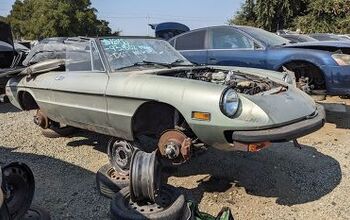Cash Strapped California Exploring Vehicle Miles Traveled Tax
California is exploring the possibility of a voluntary Vehicle Miles Traveled (VMT) Tax to help make up for the shortfall in highway funding that is derived from the increase in vehicle fuel efficiency.
The VMT was proposed by State Senator Mark DeSaulnier (D-Concord), who says that the gas tax is no longer a sufficient source of revenue for highway maintenance. Both Oregon and Washington have voluntary VMT programs, with Oregon charging 1.5 cents per mile.
The spectre of a gas tax funding shortfall was first explored by former EIC Ed Niedermeyer back in 2011. Rather than summarize Niedermeyer’s conclusions, I’d urge you to read it in full for a primer on the issue.
As it stands now, the United States has very low gas taxes relative to the rest of the world, and increasing it would be political suicide for many politicians. Americans have oriented their lifestyle towards driving long distances in big trucks and SUVs. Anyone attempting to mess with that formula is sure to have a very short political life.
The irony is that in the endless quest for fuel efficiency, gasoline consumption – and by extension, gas tax revenues – have fallen to the point where they are no longer sufficient to pay for highway maintenance and badly needed infrastructure repairs. The VMT is being proposed as an alternative in some jursidictions.
Of course, the VMT has numerous implications, including privacy concerns. The current climate is already somewhat hostile to further government intrusion, given the recent NSA spy scandal. With driving considered as one of the last activities that is largely free from data logging or excessive government oversight, the idea of tracking, via GPS technology or other methods.
Beyond that, there are likely incentives associated with a move to VMT. Will people drive less, and avoid paying the tax? Will motorists hang on to older vehicles longer, in an attempt to avoid being tracked, which in turn weakens sales of newer, fuel efficient cars? The whole thing seems like a giant Catch-22. It’s not the last we’ll hear of it.
More by Derek Kreindler
Latest Car Reviews
Read moreLatest Product Reviews
Read moreRecent Comments
- Formula m For the gas versions I like the Honda CRV. Haven’t driven the hybrids yet.
- SCE to AUX All that lift makes for an easy rollover of your $70k truck.
- SCE to AUX My son cross-shopped the RAV4 and Model Y, then bought the Y. To their surprise, they hated the RAV4.
- SCE to AUX I'm already driving the cheap EV (19 Ioniq EV).$30k MSRP in late 2018, $23k after subsidy at lease (no tax hassle)$549/year insurance$40 in electricity to drive 1000 miles/month66k miles, no range lossAffordable 16" tiresVirtually no maintenance expensesHyundai (for example) has dramatically cut prices on their EVs, so you can get a 361-mile Ioniq 6 in the high 30s right now.But ask me if I'd go to the Subaru brand if one was affordable, and the answer is no.
- David Murilee Martin, These Toyota Vans were absolute garbage. As the labor even basic service cost 400% as much as servicing a VW Vanagon or American minivan. A skilled Toyota tech would take about 2.5 hours just to change the air cleaner. Also they also broke often, as they overheated and warped the engine and boiled the automatic transmission...

































Comments
Join the conversation
re: "Americans have oriented their lifestyle towards driving long distances in big trucks and SUVs." these americans need to reorient their 'long-distance-driving' lifestyles. times have changed. conditions have changed. awareness and understanding have increased and yet, the situation continues to deteriorate, more and more rapidly. we simply gotta get those truculent desires/lifestyles inline with the harsh new realities confronting humanity.
The vehicle mileage tax (VMT) allows the users of our highway systems to fund our transportation system. As fuel efficiencies continue to improve, there are fewer taxes to fund the federal Highway Transportation system. However, the VMT will hit the financially challenged harder than those that are well off. For those that can afford to live close to work, they will obviously pay the least VMT. For those that cannot afford homes close to work, they choose homes further away and thus will pay more VMT to get back and forth from work. An efficient transportation system is critical for California’s economy and quality of life. However, the current gas tax system is NOT working to fund the repairs and maintenance of our roads. The roads get the same wear and tear regardless of a vehicle being an SUV, hybrid, or alternative fuel vehicle. California’s 100,000 electric vehicles are the most electric vehicles in any state, however, the other 97% of California’s 30 million vehicles that DO NOT run on electricity or other alternative fuels are consuming more than 40 million gallons of transportation fuels, gasoline and diesel, excluding jet fuel, EVERY DAY. Sounds like a lot of fuel, but it equates to just more than 1 gallon per day per vehicle. Even though there is a both projected growth in population from our current 38 million citizens, AND an increase in vehicle registrations from our current 30 million, the fuel demand is projected to decline slightly from the current 40 million gallons per DAY of gasoline and diesel, mostly as a result of continuous improvements in fuel efficiencies, and a slight impact by the 3% of vehicles that run on electricity or other alternative fuels. The California State Transportation Agency has estimated that the needs assessment for system preservation, expansion, and management over the next 10 years will have a SHORTFALL of almost $300 billion dollars. The fair taxation methodology to maintain the roads is to have the users of those roads pay for maintaining them, thus the vehicle mileage-based user tax system (VMT) seems to be an easy decision, even though it will hit the financially challenged harder.